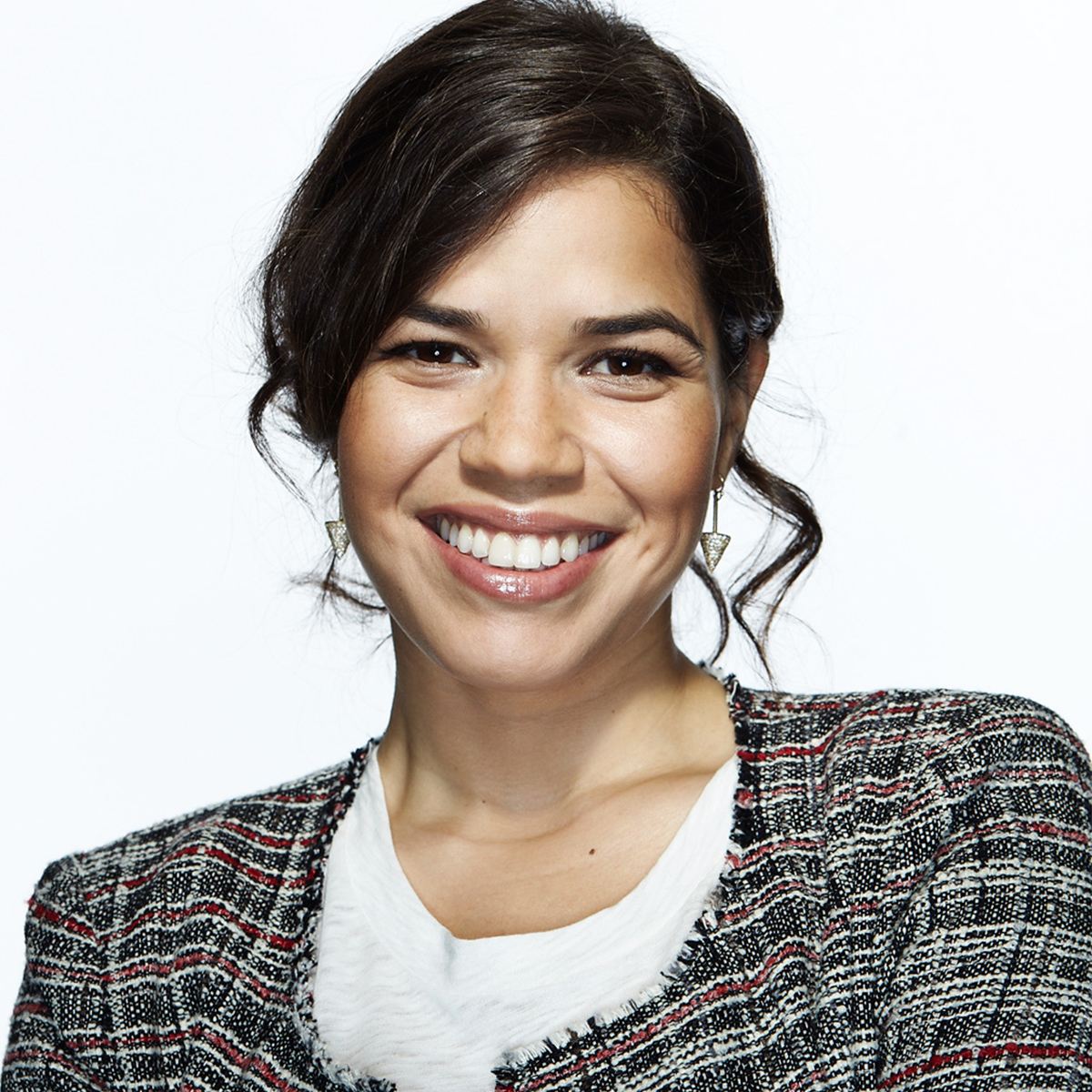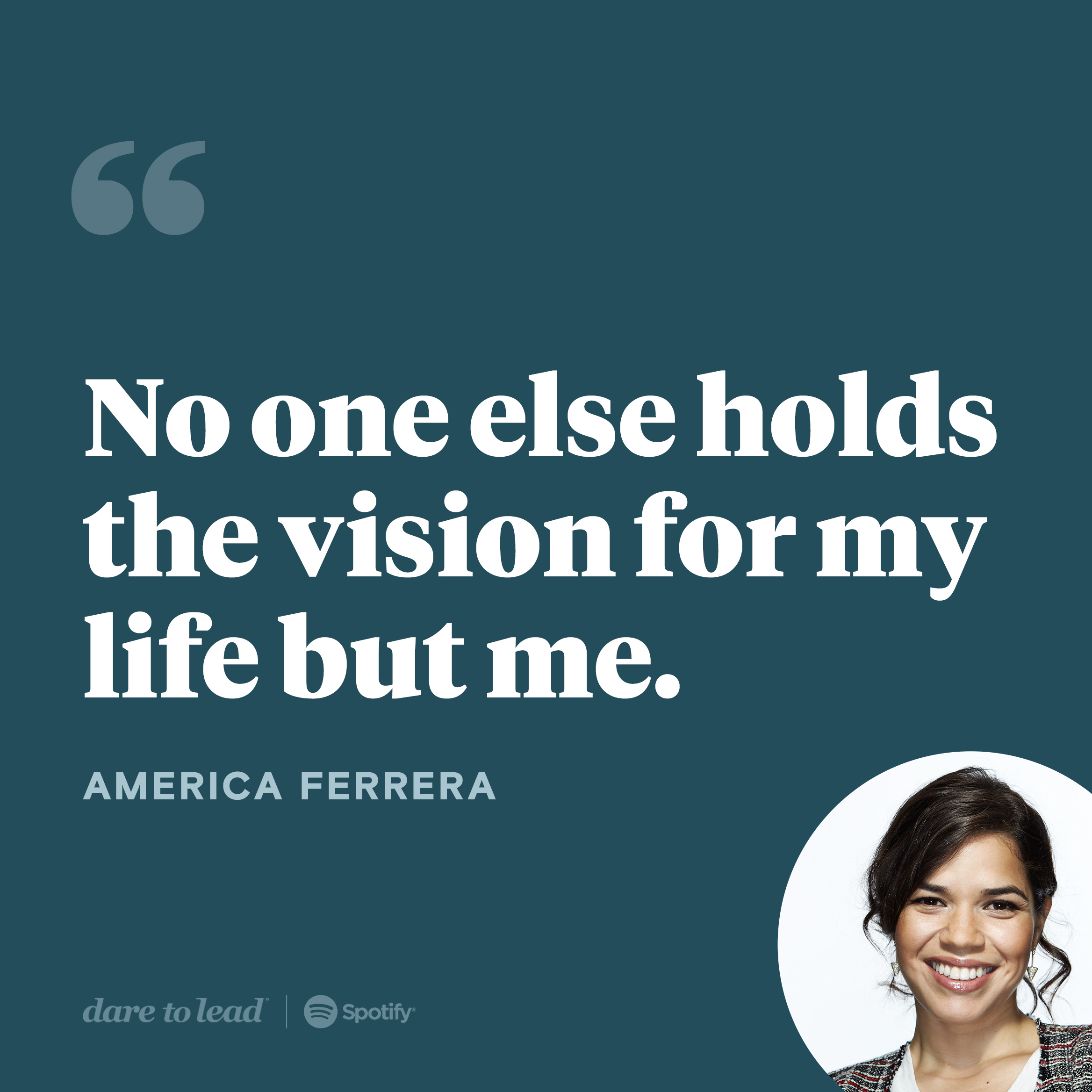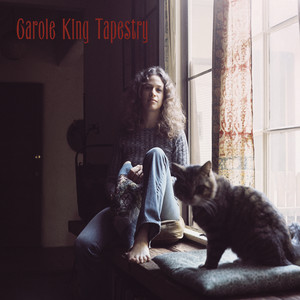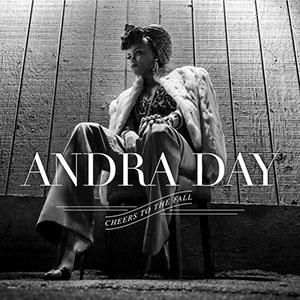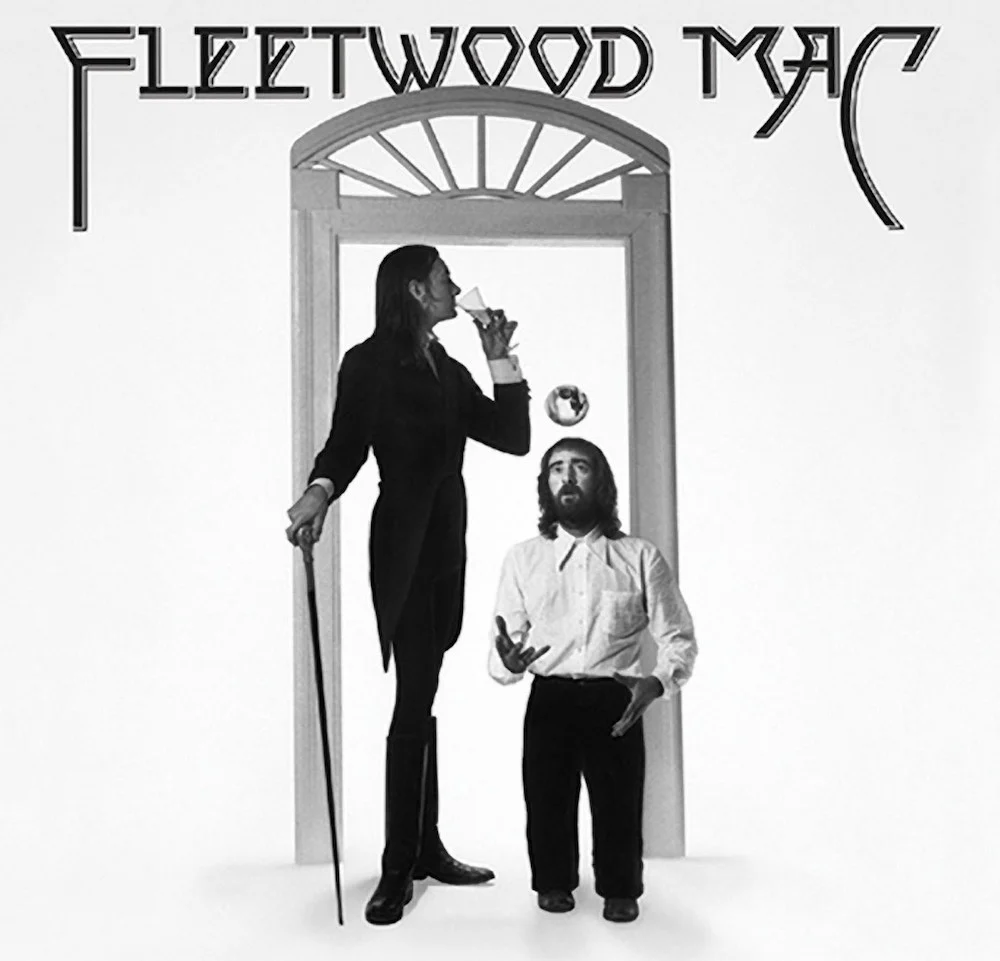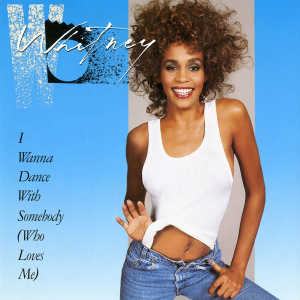Brené Brown: Hi, everyone. I’m Brené Brown, and this is Dare To Lead. I am back for Episode Two with America Ferrera, actor, director, producer, activist, and leader, which we all talked about in Episode One. She is just deep and expansive and what we need to hear, and it makes me so freaking… Doesn’t it make you hopeful for the future, Barrett?
Barrett Guillen: Oh, yes.
BB: I’m like, come on. Of all the podcasts I race to tell my 22-year-old daughter to listen to, this, this was on the top of the list. Like, listen, learn, love, get pissed. Do it all. So we’re here with Part Two, we’re going to continue to talk about integration, how we can integrate our identities into our leadership and our journey. The conversation literally goes… In a million years, even if you would have put the options in front of me, would you have ever guessed where this went?
BG: No. No, but it was perfect how it ended up.
BB: Yeah, it’s just incredible. I fell in love. And you’ll see again, the rapid fire questions, not so rapid, they are deep burning fire questions, that’s what we’re going to call them for this episode. So before we start, this is the last Dare To Lead episode we’ll have this year. This will run on Monday, December 13th, and we won’t be back on Dare To Lead, until the middle of January. We’re going to be taking a little time off for the holidays to spend some time with our families, but we’ll be back, rested, excited, and ready for what I’m calling the big awkward as everyone returns to offices and no one knows what the hell’s going on. We need to do some kind of video montage of the handshake, elbow, fist bump, get the hell away from me.
BG: TikTok.
BB: TikTok, maybe we’ll put it on TikTok. But first, we’re going to wrap up the year with the second part of my conversation with America Ferrera, which… Oh my God, what a bad ass! Just so good. I just am so glad she’s here, I’m glad you’re here. Let’s listen and learn together. Alright, before we jump in, let me tell you a little bit about America. I’ll keep it short since this is Part Two. She’s an award-winning actor, director, and producer, she played Betty Suarez, who we loved on the ABC hit comedy, Ugly Betty. She won an Emmy, Screen Actors Guild Award, Golden Globe, ALMA. She has produced and directed episodes of Netflix’s incredible show, Gentefied. Also executive produced, directed episodes, and starred in NBC’s really, really good comedy Superstore, and she’ll make her feature film directorial debut with I Am Not Your Perfect Mexican Daughter, which will be released on Netflix in 2022 or 2023.
BB: And she’s here and let’s just jump in. I’m not even going to keep you from this any longer, it’s too damn good. Okay, welcome back to Part Two of our two-part series with America Ferrera. So in Episode One, we talked about identity and leadership, expectations, presence, we talked about how presence creates change. We also started talking about the idea of integration. So, man, your life experience is just a master class on what I’ve seen in my work and on the importance of not alternating but integrating, so I want to dive into that more with you in this second episode. It’s funny, I write about integration a lot, and one of my favorite things is that the root of the word integration, the Latin root, is “integrare,” and it means to make whole. To make whole. Are there ever parts of yourself that you still…
BB: A lot of people, especially leaders, to be honest with you, even today, and especially women, have a tendency to acquiesce to orphaning parts of themselves to be seen more as a leader. Are there any parts of yourself that you ever have to stop and say, “Woah, America, bring her along.” For me as a young academic, it was motherhood. My deans would say, you’re great, you’re on the path, but anything that looks like a mom, smells like a mom, or God forbid has a kid in toe, you need to leave out of here. And I was like, but that’s my super power. I can’t do that. Are there any parts that you have to remind yourself, “Hey, she’s part of this too?”
America Ferrera: What an amazing question. If I’m being perfectly honest, I would say that I have, whether consciously or unconsciously, left out of the picture my sexual self, my sexual being, when it comes to my work. I think part of it has to do with the expectation that that is first and foremost what we’re supposed to be in these spaces. We’re supposed to be desirable. We’re supposed to be beautiful. We’re supposed to be fuckable. I don’t know if I’m allowed to say that on your podcast.
BB: Yes, the truth is always allowed.
AF: And I think that my response, again, conscious, unconscious, who knows, was to try and build a career, relationships, a body of work that didn’t rely on that, didn’t play to that. And also for my own comfort, I didn’t want to feel that disgusting feeling of, at the end of the day, I have this job because that guy can picture wanting to sleep with me. And I don’t know what that means… I don’t think that one’s sexual self necessarily needs to be in every single conversation or every room, but when you talk about your sexual energy, when you talk about that part of our identities are so linked to our creativity, they’re so linked to the parts of us that create and that spark inspiration, and…
BB: Passion, pleasure, yes!
AF: Light creative fires, and passion and obviously, there’s a million ways to express that part of ourselves and do it all the time through joking. You know what I mean? Joking or laughing or complimenting, right? Complimenting how pretty you look in that dress today. They’re allowed to bring that part of themselves of like, “I’m a human with eyes, how could I not see that you look hot in that dress” or whatever it is, but that’s an aspect for me that I feel like I didn’t want to lead with and didn’t want to have to prove all the time, and didn’t… Just didn’t want to feel the yucky feeling of that I still had to feel many times in my career, which is even at a photoshoot, even if it’s just with all women, woman photographer, woman designer, women wardrobe people staring at you, six people deciding whether or not those pants look okay on you, it’s a system of valuation that is ugh, it’s just so yucky.
AF: And I left that out purposefully for a lot of my life and career, and I think one of the ways in which I am reclaiming that is to give myself the permission of experiencing the pleasure of my own creative self, my own sexual self, my own passionate self, my own beautiful self, reclaiming my idea of what is beautiful and what makes me beautiful, and truly, I did it with the help of other women. The experience of being on the red carpet was for me as a young kid a crushing one. A real soul-crushing experience of knowing that there was an expectation and never ever meeting it, because no one ever does, right? Because you can’t.
BB: No, no. That’s how it works.
AF: And you’re open and vulnerable to everything and anything anyone wants to say about you. And I think the other element of this for me is that through Real Women Have Curves and Ugly Betty, my appearance was very front and center of my career in a way that was empowering to a lot of people. You know, I was 17 when I did Real Women Have Curves. To dance in your underwear to music with other women is fun and empowering to watch, I was terrified, I was a terrified child. So many people found so much empowerment in that character and in that movie as they should, I had a much longer journey to finding my own empowerment physically and how that links I think to leadership and showing up in spaces is, I feel like I spent a lot of my younger years of my career believing that at the end of the day, that was the most important measurement of my value, and I believed it. Something deep down in me still believed it, even if I fought it, even if I resisted it, I hadn’t come to terms, I hadn’t made peace with my relationship to my beauty, I just pushed it away. I just thought, I don’t need that. It’s too hard, it’s too complicated. I’ll just leave it out the door.
AF: I don’t need to play the game, but what a devastating loss for me that I don’t get to own my own beauty, that I had to abandon it and disown it, because it was too uncomfortable to hold in this industry, in this space. And so, part of the way that I have reclaimed it is just changing the value of it, just knowing that I am beautiful, that I am sexy, that I am… That not everybody needs to know me as a sexual person, not everybody needs to have access to every part of me, but that I want the freedom to bring the parts of me that I want to share on my terms. And it’s a much longer journey, it could be a whole other two-hour conversation about how I got there, but I am finally at a place where, when I get a red carpet assignment, I’m thrilled. I’m like, “Yes. How do I want to play today? What do I want to wear? Do I want to do a suit with my hair tied back? Do I want to do a dress? Do I want to like, feel sexy? Do I want to feel strong? What do I want to feel today? What do I want to put out there?” And it’s for me. You know, it’s for me.
AF: And I can feel the difference and I think other people can too. And so, this is a really… I don’t know if any of this is making any sense or if it’s anything you wanted to talk about on your podcast, but I do think that a really big part of me stepping into my power in all things was about righting my relationship with my sexual being that I felt like I had to abandon, because it was too uncomfortable to bring her along in these spaces.
BB: Oh my God, it’s so painful and so hopeful. I mean, how many of us had to say to our sexual selves, our physical selves, our beauty, our passion, I can’t protect you in these spaces, so I’m going to kill you rather than letting someone else take you and kill you or take advantage of you. And then, it leaves this huge hole in us. It makes perfect sense, because again, I think there’s this wholeness to bring, are we whole without that part of us? I don’t think we are whole without that part of us.
AF: No.
BB: You know? And I think our power comes from our wholeness, so I’m so grateful that you had the courage to share this. I think this will be deeply important and resonating for the people listening, because I’m telling you, America, hundreds of thousands of people I’ve talked to in my research, and we’re always orphaning the parts of us that we’re either afraid we can’t protect or we are afraid that will hold us back, and every time we do that, we cut some of our own power off. And I see you different today. When I see you… [chuckle] No, when I see you, you are in your power, it emanates from you.
AF: Thank you.
BB: Alright, you ready for some rapid fire? [chuckle]
AF: Yeah. I’m so surprised at where this conversation went. [laughter] That’s not at all what I thought we were going to talk about, but I love it.
BB: Is it okay?
AF: Oh my God, it’s so okay, it’s great.
BB: I think everybody here is like this, they’re mouthing, “Holy shit.” [laughter] Yeah, no, it’s great. Fill in the blank for me. Vulnerability is…
AF: Power.
BB: What’s something that people often get wrong about you?
AF: This is such a funny question because it means I have to think about how other people see me, and I don’t care. [chuckle]
BB: Praise the Lord. Okay, what’s one piece of leadership advice that you’ve been given that’s either so great you need to share it with us or so shitty you need to warn us? [chuckle]
AF: One great life-changing piece of advice I got was learn how to allocate the resource of you. [chuckle]
BB: Whoa. Did you hear that? Shit, man.
AF: Yeah, it changed my life and…
BB: What does that mean for you? Tell me your life before that advice, your life after that advice, how did it change?
AF: Oh my gosh. Well, I had to do everything and I had to do everything myself to prove to myself that I could, to prove to others that I was hard working, that I was good enough, that I was humble, that there was nothing too small for me, that, “Yeah, I’ll restock the fridge,” and, “I’ll brainstorm the big ideas,” and, “I’ll get the coffee,” and, “No, no, no, please, you sit down, I’ll turn up the heat,” or whatever it is. And those are small stupid examples, but that’s also the like, “Yes, I’ll show up to the opening of the new rescue dog center,” and, “Yes, I’ll speak over here,” and, “Yes, I’ll say yes to everything because I don’t want anybody to think that I’m ungrateful,” which I know you’ve talked about on your podcast.
BB: Ungrateful, yeah.
AF: The thinking that my energy should go to wherever it was requested, [chuckle] versus the mindset of what are the things that only I can do and that I’m good at doing, because I’m not good at doing everything, and there are actually people who should be doing that that are better at doing that than me. Give away a little bit of control, let go of your ego and ask for help and receive the help and become better at and more efficient at the things we need you to do because there’s only one you.
BB: Amen.
AF: I feel like it truly, truly, on every single level changed my life, it changed my happiness, my health, it changed everything, because it gave me the opportunity to say no, it gave me the permission to say no.
BB: God, I love this. Okay, what’s one hard leadership lesson that the universe keeps putting in front of you because you have to keep re-learning and unlearning, and learning it over and over? [laughter] I wish they could see your face right now.
AF: Oh my God.
BB: She’s doing the… Clinicians call this the face rub. It’s like when… That’s like the, “Oh, holy shit.”
AF: The face rub. Oh my gosh. Okay. This is a complicated one, okay, and maybe we don’t have time to unpack it.
BB: We have time.
AF: Stop giving my power away to mommy and daddy figures that I think are going to fix it.
BB: Fuck! Dammit. Okay, talk to us. Painful, this is painful for me.
AF: I was 17 when I started my career, I was a child. I had no idea what I was getting into. I needed mommies and daddies to tell me where to go, what to say, how to dress, and I was much more comfortable with other people holding the power and just telling me what the right way to do it is. Which is fine when you’re 17, probably appropriate when you’re 17, not so much when you’re 25 or 30 or 35. That transition of learning no one else holds the vision for my life but me.
BB: Say that again.
AF: No one else holds the vision for my life but me. I hold that vision, it’s in me. And it was my youth, but it was also the world around me that told me there were specific people who knew the answers, and mostly they were white men. They knew the answers and they were the ones to give you permission and they were the ones to give you validation that you could get something, that you could ask for it, that you deserved it. And how to get it. And that is a deeply, deeply ingrained value system and belief system, and one that I feel like I’m still weeding out of me. The need for white men to tell me the right way or what’s right for me, and that… Like I said, I don’t know that we have the time to unpack all of that, but it’s… Again, I’m being… It’s a lesson.
AF: And I think it’s important to talk about it because none of us are outside of the culture, it’s the air we breathe, and I feel like it’s the only way anything changes when we’re willing to acknowledge where inside of our bodies does that value system lie. Where in my decision-making process do I favor the thing that the culture has always favored. And I think it’s so important to be so alert and attune in those moments where you are making those decisions, asking, “What’s informing this decision? Why do I trust X more than Y? Why do I lean towards this person having more power in this situation than that person who I trust, who I don’t trust, who I advocate for, who I don’t.” I don’t think anything changes until we’re willing to see where it lives in us.
BB: That’s right. And I think there’s so much… You’re in your 30s, right?
AF: Yeah. I’m 37.
BB: Yeah, and I’m in my 50s, and that doesn’t go away. That doesn’t go away, especially if you have any piece of you left that needs to be the good girl who’s patted on the head. Yeah, that’s real. And like you said, it’s in the air you breathe, it’s in the water you drink. This reminds me very much of your TED Talk, and if y’all have not seen America’s TED Talk, it is fire. It is…
AF: Aw, thank you.
BB: Yeah, it is so… There’s so much depth to it. It’s, yeah, asking permission to be in a system versus saying no.
AF: And for me, leadership, my leadership has been about trying to be as honest with myself about the process and what happens moment to moment in a creative process, in decision-making processes that do shift the power. If the goal is to change the way things get done, it’s not enough to change the color of the faces, the gender.
BB: That’s right.
AF: You have to be willing to interrogate the moment-to-moment decisions and how those decisions feel in your body, where they land, when does the energy in the room shift towards, “Yeah, we’re just going to do it the way we’ve always done it.” When does the fear take hold, when does the doubt, when does the battle of attrition just win? And things just go back to the default. And I’ve been in those rooms, rooms full of people of color, of rooms full of women.
BB: Yeah, me too.
AF: Nary a white straight man in sight.
BB: Yeah, no, no, yeah.
AF: And yet the same belief system is playing out and with what, it makes it better because we’re all people of color, because we’re all women? No. The same process of power distribution, and who gets to make decisions…
BB: That’s right.
AF: And who has the ability to tell stories, and who has the authority to tell their stories and make the decisions when they matter, that’s what’s really going to change things, not just putting more people of color or changing the shapes and sizes and faces in the room. We have to change how we make decisions, and we have to stay present with the physical feeling of how we make decisions, because if we don’t become aware of it, then it’s always outside of us. The problem is always outside of us, and then the solutions are outside of us and nothing ever changes.
BB: No, and I don’t think you can do what you’re talking about. At least I’ve never been a part of it where it’s been done successfully, where you’re not embodied and attuned to fears and feelings. If you de-humanize the process, it will always default to the system that’s built, period. God, that’s so good.
BB: Alright, tell us one thing you’re very excited about right now.
AF: I am so excited. Well, oh my gosh, I’m so lucky, I’m so excited about so many things.
BB: You can tell us more than one.
AF: Well, I’m so excited that Gentefied is out in the world, Season Two, because it is such a miracle when authentic storytelling from Latinx creators survives, when it finds opportunity, and when it comes out into the world. I know from my 20-year history that that’s an opportunity for someone’s life to be changed, to see themselves in a way they’ve never seen themselves, and the work and the blood, sweat, and tears, craftsmanship work that goes into creating and then protecting and getting that thing out into the world, it cannot be underestimated. And so it’s a little miracle, it survived, it did, and we did it, we did it. And we’ve won, we’ve won because it’s out there in the world and people are going to find it, and it’s going to find the right people, and it’s going to do what it was meant to do, which is have people be seen and feel represented and like they matter. And so I’m just so proud of the team that put it out there and the way that we did it, the consciousness with which we did it, and the love with which we did it, the pouring of love into the material and also to the audience, and we’re feeling it too, from the audience, so I was just… I’m so excited about it.
BB: You have to have love as a foundation for anything that I watch where I can feel both just unending hope and despair in the same moment when I’m watching that sometimes. It is so beautifully acted and written, God, it’s beautiful. It’s really beautiful.
AF: Thank you. Thank you. Yeah, it’s… As a storyteller, as an executive producer, as a director, it’s a dream come true, because really what this season is about is about it is about fathers, it’s about fatherhood, it’s about masculinity, which I think you don’t have to be Latinx to relate to, but is particularly potent and needed in our culture. This conversation about how men show up in our families, how they show up for each other and one another, and that’s not a Latinx story, that’s a human story.
BB: That’s a human story.
AF: You know, and getting to tell it through our lens is, it truly is like… It’s such a gift, and I never take it for granted, and I want it to be celebrated for the little miracle that it is.
BB: Congratulations.
AF: Thank you.
BB: Anything else you want to share with us that you’re excited about?
AF: I am so excited I’m going to direct my first feature film.
BB: Tell us. [chuckle]
AF: It’s based on a stunning novel titled I Am Not Your Perfect Mexican Daughter, written by Erica L. Sánchez, a brilliant author. I read that book and just was stunned, stunned to get to see a 17-year-old girl, a Mexican-American girl, in all of her flaws, in her anger. And again, I already feel like I have to justify it. She’s funny, and she’s smart, and you like being around her, and she’s arty, and she’s… But she’s angry. And that’s the part for me that I’m like, yes. When do we get to be angry? When do we get to…
BB: Oh God I can’t wait.
AF: To not be perfect. It’s all about what you said, like coming away from that assignment of being the likeable figure, the likeable girl, and she’s so brave and she’s bold and she’s so bad ass. And I spent the last year with my brilliant writer, Linda Yvette Chávez, adapting the book to the script, and this is, 2022 is the year that we make it, and it’s the first time I will be directing a feature film. And directing is truly a dream and is absolutely a leadership role and also plays into everything that I love about being in a leadership role, which is, you’re just there to create a circumstance in which everybody gets to shine. Where everybody gets to do to their best work, and the marker of your success as a director is how well you created the conditions for everybody else to do their best work and…
BB: That’s leadership. That’s it.
AF: Yeah, yeah.
BB: Where do you feel confident that you’ll be able to create that culture? And what makes you nervous?
AF: Yeah. Oh my God. Such a good question. Where do I feel confident? Well, I guess where I feel confident is I have 20 years of experience being on sets. I’ve had good experiences, I’ve had bad experiences. I also, at least on the actor side, I have a really good idea of what I’m asking of them. I have so much love and respect for what actors do, what we ask of them, to bring their whole selves to be vulnerable, to open up, to share very real experiences and their humanity on camera, on action. “Go.” You know. “Go.”
BB: God that’s hard.
AF: “Be human. Do it.” And I have such love and such respect for it as I do for everybody who shows up on set and brings their talent, and so I have such confidence that I can love everybody and love them, respect them, love what they’re bringing and create space for them to feel that love and respect, which I have seen and experienced in my own body, but with my own eyes, the difference that makes when there is a genuine support for you to do your job and when there’s a deeper understanding of what’s being asked of you, versus people who come in and are just like, “That’s your job, do your job.” I would just, “Okay, yeah, that’s one way to do it.” But also…
BB: You get back what you put out in that situation, I think.
AF: Yeah, exactly. You’re not always getting the best of people. So, I feel really confident in that, and then I guess what scares me is just time. Like having the time to do it. I feel like in my short directing career and experience, I’ve learned the lesson that anything can be beautiful and perfect if you have the time to keep going until it’s beautiful and perfect. But you’ve got to do it in the time frame and the thing that the director has to hold, which I imagine is true for leaders everywhere, is this understanding that your job is to create a creative environment, and that’s about letting go. That’s about relinquishing control. And that’s about, how do I create an environment in which the unknown gets to happen? We’re not just hitting marks and saying lines, we’re looking for a mystery. And so we don’t know, and at the same time, your job is to be on schedule and get the shots and make the day and stay on budget. And so that tension between holding the creative magic and also…
BB: Constraint.
AF: Being incredibly practical within those constraints, that tension lives right here in my lower back, [laughter] but it’s also part of what I love about it because you have to fire on all cylinders, or at least that’s how I do it, and that’s what I love about it. So, I am genuinely just bursting at the seams to step into that particular leadership role coming soon.
BB: We cannot wait, and when do we get to see it?
AF: Who knows? We’ll shoot it next year and then I guess, hopefully, if all goes well, it’ll be out in 2023.
BB: I can’t wait. Okay, I have to ask you these questions from the Unlocking Us rapid fire, because I’m so curious, last thing you watched, you binged, and loved?
AF: I binged Hacks on HBO Max.
BB: Oh yeah, yeah.
AF: We I loved it. Like laughed-out-loud, enjoyed it very, very much.
BB: Jean Smart.
AF: Jean Smart is so brilliant. I have two very young children, so my parents… I had my daughter in May 2020, beginning of the pandemic.
BB: Oh God.
AF: So, my quarantine time was not necessarily a catch up on television time.
BB: No. [chuckle]
AF: It was filled with very young children, so I don’t actually have that many things that I’ve gotten to binge, but that is the last one that I gobbled up and enjoyed very much.
BB: Favorite meal?
AF: Ever?
BB: Ever, if you could have anything.
AF: Yeah, we were in Italy and we got lost in Montepulciano, I want to say, and we just pulled over to the side of the road into this tiny little Italian restaurant. We could see the mamas in the back flipping pasta in Tupperware, and I can still taste the pasta. It was the most simple Pomodoro, and it was… I can still taste it, it was the best meal of my life, nothing will ever [chuckle] compare, I don’t think.
BB: Tell us one thing you’re deeply grateful for right now.
AF: My children, I delight in them so much and I’m grateful for all of the support I have to be able to show up as the mom I want to be for them.
BB: Alright, we asked you for five songs you can’t live without, you gave us six. [chuckle] We’re going to let you slide just because we love you and… Oh my God, what a list. Okay, so you gave us “I Wanna Dance with Somebody,” by Whitney Houston, “Landslide,” by Fleetwood Mac, “Sinnerman,” by Nina Simone, “Rise Up,” Andra Day, “Funky Town,” by Lipps Incorporated. Is that, “Won’t You take Me to Funky Town?” [chuckle] Okay.
AF: Yeah.
BB: And then, “Beautiful,” by Carole King. In one sentence…
AF: Oh my God.
BB: What does this mini-mixtape say about America Ferrera?
AF: She likes to cry [laughter] and dance.
BB: You did say you’re an easy crier. She likes to cry and dance.
AF: She likes to cry and dance, and preferably both at the same time. [chuckle]
BB: Thank you so much for being on Dare to Lead, this has been an amazing conversation, I’m so grateful.
AF: Oh, I’m so glad. I’m so glad. It was an honor. Thank you for having me.
[music]
BB: Okay y’all, just take a deep breath. Think about, again, our big, complicated, messy, awesome, just falling down, getting back up, growing up, growing down selves, bringing all that together. The world doesn’t want us to bring it together, the world doesn’t support and encourage integration, because that’s where our power comes from, and there are a lot of people who benefit from us not being fully in our power. So, I call bullshit on that. And we just can’t step forward in a sliced and diced, compartmentalized self. It just doesn’t work. We are breaking for how long Barrett? Several weeks?
BG: Oh yes, we come back…
BB: Come back in January.
BG: Yes.
BB: Okay, we come back in January. I hope you have a great winter break. Yeah, I am, strap yourselves in, taking off four or five weeks. I’m just going to tell you right now, I’m going to watch a lot of British mysteries. I’ll have an accent when I come back. I’ll be like, “Bloody hell.” That’s [chuckle] “Bloody hell.” I’m going to say all of the English cuss words, I’ll be like, “I think that’s bollocks,” I’m going to be like that person. And I’m going to be in pickleball shape, I’m playing every day, four times a day.
BG: [laughter] Okay.
BB: I am, I’m going to do it all, and just rest. And Barrett’s shaking her fists in the air like…
BG: Whoop, whoop.
BB: Oh, so okay, that’s what that means. You can find all the links to where you can find America, her handles on Twitter, Instagram, social media. Links to Gentefied, links to… If you’ve never seen, Real Women Have Curves, that movie changed me. You know why? I didn’t think I was allowed to dance in my underwear, because I didn’t look like the models in Seventeen Magazine. I thought only you had to look like the models in Seventeen Magazine to have permission to dance in your underwear. No, ma’am. Not the case. So, you’ll have an episode page that has everything to link to America, and thank y’all for being with me on this learning, unlearning, re-learning, stepping in, stepping up journey. I’m really grateful for y’all. Stay awkward, brave, and kind. And I’ll see y’all in January.
[music]
BB: The Dare to Lead podcast is a Spotify original from Parcast. It’s hosted by me, Brené Brown, produced by Max Cutler, Kristen Acevedo, Carleigh Madden, and Tristan McNeil and by Weird Lucy Productions. Sound design by Tristan McNeil and the music is by The Suffers.
© 2021 Brené Brown Education and Research Group, LLC. All rights reserved.




